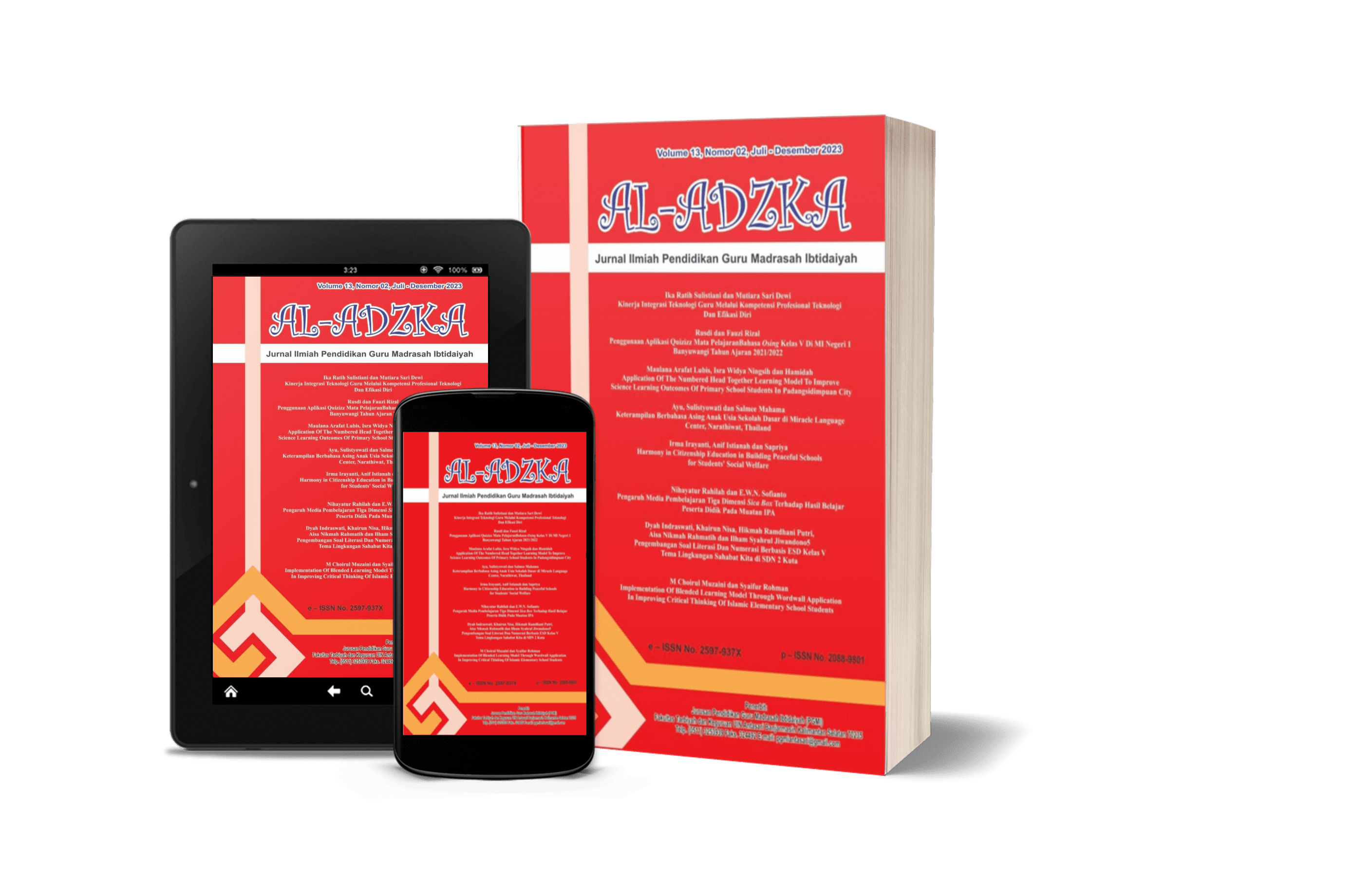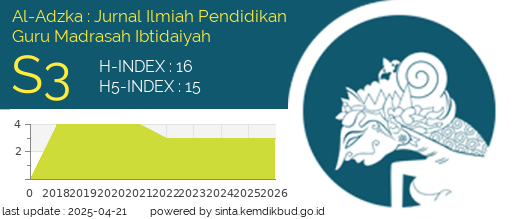The Transformation of Qur'an Literacy Through the Tahfidz Method: An Experimental Study on Elementary School Students
DOI:
https://doi.org/10.18592/aladzkapgmi.v15i1.15682Keywords:
Tahfidz method, Al-Quran memorization capacity, Tadjwid, Al-Quran literacy, Elementary SchoolAbstract
The Tahfidz method strategically improves students' Qur'an literacy, especially in tajwid, fluency, and memorization. This study aims to evaluate the effectiveness of the Tahfidz method in increasing the memorization capacity of the Qur'an of grade 6 students of SDN Jatimekar through a pseudo-experimental approach with a Nonequivalent Control Group Design. 72 students were divided into an experimental group (Tahfidz method, n=36) and a control group (conventional method, n=36). The results of the t-test showed a significant difference between the average final test score of the experimental group (82) and the control group (78), with t(70) = 4.094, p < 0.05. The Tahfidz method has been proven to significantly increase the memorization capacity of the Qur'an, especially in the application of Tajwid and fluency in reading. The study offered novelty through the correlation of the intensity of the Tahfidz method with the improvement of students' abilities, showing a significant positive relationship (r = 0.917, p < 0.05). The implications of this research include integrating the Tahfidz method in the curriculum, teacher training for the effective application of methods, and using technology such as gamification to overcome time constraints and student motivation. This research makes an important contribution to the development of national Qur'an literacy and becomes a practical reference for educators and policymakers to improve the quality of Islamic religious education.References
Aprilia, M. (2024). Pelaksanaan dan Tantangan Program Tahfidz Qur ’ an di MTs N 1 Yogyakarta. Nusantara: Jurnal Pendidikan Indonesia, 4(4), 1115–1130. https://doi.org/10.14421/njpi.2024.v4i4-16
Brocca, N. (2024). Adoption of new technologies in pre-service teachers. The case of interaction-enhancing videos. Teaching and Teacher Education, 138(October 2022), 104427. https://doi.org/10.1016/j.tate.2023.104427
Candra, W., Sutarto, S., & Ridwan, R. Bin. (2021). Penerapan Metode Talqin dengan Menggunakan Media Audio dalam Program Tahfidz Al-Qur’an. Muaddib: Islamic Education Journal, 4(1), 51–61. https://doi.org/10.19109/muaddib.v4i1.14371
Fathah, M. U. A. F. (2021). Metode Tahsin Dan Tahfidz Al-Qur’an Di Pondok Pesantren Smp Mbs Bumiayu. Ilmu Ushuluddin, 20(2), 188–202. https://doi.org/10.18592/jiiu.v%vi%i.4750
Fatimah, S., & Sumarni, S. (2024). a Holistic Approach To Islamic Basic Education: Synthesizing the Development of Students’ Potential From Intellectual, Spiritual and Emotional Aspects. Pionir: Jurnal Pendidikan, 13(2), 106. https://doi.org/10.22373/pjp.v13i2.24259
Fatmawati, R., Slamet, S., Hastuti, I. B., Suherman, S., Rahmaniati, R., & Khusnani, A. (2023). Pengenalan Hafalan Al-Qur’an dengan Metode Zahrawain untuk Meningkatkan Ketangguhan Literasi Anak. Buletin KKN Pendidikan, 5(2), 137–146. https://doi.org/10.23917/bkkndik.v5i2.23167
Fikri, M., Ismail, B., Faizulamri, M., Mohd, B., & Alias, N. Bin. (2024). Competency Requirements for Tahfiz Teachers Enrolled in Tahfiz Curriculum in Malaysian Teacher Education Institute. Journal of Chemical Health Risks, 14(4), 2043–2051.
Gafur, A., Nurhasan, Switri, E., & Apriyanti. (2023). Pentingnya Ilmu Tajwid dalam Mempelajari Al-Qur’an. Community Development Journal: Jurnal Pengabdian Masyarakat, 4(6), 13337–13343. https://doi.org/https://doi.org/10.31004/cdj.v4i6
Giyanti, Ernawati, & Setiadi, H. (2022). Penilaian Tahfiz Al-Qur ’ an (Cet. 1). CV Bintang Semesta Media.
Hamka, M., & Alim, A. (2024). Implementasi pengajaran Adab di Kuttab Ummul Quro. Tawazun: Jurnal Pendidikan Islam, 17(2), 347–372. https://doi.org/10.32832/tawazun.v17i2
Hariadi, B., Sodig, M., & M, N. F. (2022). Profesionalitas Guru Pendidikan Agama Islam dalam Meningkatkan Kualitas Pembelajaran Siswa di Madrasah Tsanawiyah Bi’rul Ulum Sidoarjo. El Banat: Jurnal Pemikiran Dan Pendidikan Islam, 12(2), 138–158. https://doi.org/https://doi.org/10.54180/elbanat.2022.12.2.138-158
Irlina, A. (2019). Teaching The Holy Quran to Young Learners (7-12 Years Old). Al-Adzka: Jurnal Ilmiah Pendidikan Guru Madrasah Ibtidaiyah, 9(1), 21. https://doi.org/10.18592/aladzkapgmi.v9i1.3054
Ismael, I., Muazza, M., & Sulistiyo, U. (2023). Program Unggulan Sekolah Berbasis Islam: Analisis Manajemen Program Tahfiz Qur’an untuk Ketercapaian Target Hafalan. Fitrah: Journal of Islamic Education, 4(2), 272–285. https://doi.org/10.53802/fitrah.v4i2.447
Ismail, S., Mustafa, N. M., Shaharuddin, S. A., Yahaya, M., & Razali, K. S. (2024). Learning Style Through Fun Al-Quran Digital Application (Fun Q). Journal of Advanced Research in Computing and Applications, 32(1), 13–21. https://doi.org/10.37934/arca.32.1.1321
Khoeron, M. (2023). Survei Kemenag, Indeks Literasi Al-Qur’an Kategori Tinggi. Kementerian Agama Republik Indonesia. https://kemenag.go.id/nasional/survei-kemenag-indeks-literasi-al-qur-an-kategori-tinggi-w0A7W
Kurniawan, R., Bakar, M. Y. A., & Kholis, N. (2024). Integrating Quranic Framework for Digital Literacy Curriculum in Madrasa. Al-Tadzkiyyah: Jurnal Pendidikan Islam, 15(1), 87. https://doi.org/10.24042/002024151642200
Mahmud Yusuf Zulfikar, Hafidz, & Syarifah Azzahro. (2024). Penerapan Metode Talaqqi dalam Program Tahfidz Anak Usia Dini di Rumah Tahfidz Desa Beji. Didaktika: Jurnal Kependidikan, 13(2), 1755–1766. https://doi.org/10.58230/27454312.589
Maria, L., Scoot, A., & Jo, S. (2023). Tahfidz Al-Qur’an Learning Strategy in Increasing the Achievement of Tafsir Learning. Journal Neosantara Hybrid Learning, 1(1), 67–78. https://doi.org/10.55849/jnhl.v1i1.68
Markhabi, F., Nurmawati, & Salminawati. (2024). Efektivitas Program Tahfizh Al-Qur’an di SMP Tahfizh Azhar Centre. Didaktika: Jurnal Kependidikan, 13(1), 441–454. https://doi.org/10.58230/27454312.512
Mulyani, E. S. (2021). Implementation of Tahfidz Curriculum Management in Tahfidz Qur’an Elementary School. Indonesian Journal of Islamic Studies, 4(1), 6–14. https://doi.org/10.21070/ijis.v4i0.1584
Musfeld, P., Dutli, J., Oberauer, K., & Bartsch, L. M. (2024). Grouping in working memory guides chunk formation in long-term memory: Evidence from the Hebb effect. Cognition, 248(April), 105795. https://doi.org/10.1016/j.cognition.2024.105795
Pradono, S., Astriani, M. S., & Moniaga, J. (2013). a Method for Interactive Learning. CommIT (Communication and Information Technology) Journal, 7(2), 46. https://doi.org/10.21512/commit.v7i2.583
Rahayu, T., Subando, J., Fatimah, M., Haq Rumaf, A. F., & Hussain Solihu, A. K. (2023). Optimization of Teaching Strategies of Tahfidz Teachers To Improve the Quality and Quantity of Students’ Memorization of the Qur’an. Profetika: Jurnal Studi Islam, 24(02), 259–268. https://doi.org/10.23917/profetika.v24i02.1976
Rahman, I., Nisa, K., & Saputri, R. E. (2020). Seven Students’ Activities: A Case Study on Rumah Tahfidz An-Nur Daily Routine and Memorization Levels. International Journal of Multidisciplinary Research of Higher Education (IJMURHICA), 3(3), 110–120. https://doi.org/10.24036/ijmurhica.v3i3.184
RI, B. L. dan D. K. A. (2022). Instrumen Penilaian Buku Baca Tulis Al-Qur’an (BTQ).
Rizki, B. (2023). Learning Methodology of Tahfiz Al-Qur’an in Islamic Elementary School. Scaffolding: Jurnal Pendidikan Islam Dan Multikulturalisme, 5(1), 832–848. https://doi.org/10.37680/scaffolding.v5i1.3028
Rusadi, B. E. (2020). Tahfiz Online: Sarana Menghafal Alquran Secara Online. Intiqad: Jurnal Agama Dan Pendidikan Islam, 12(1), 18–33. https://doi.org/10.30596/intiqad.v12i1.4593
Saragih, R., Mesiono, M., & Nasution, I. (2021). The Management of Tahfidz Al-Qur’an Learning at Homeschooling Public Learning Center. Nidhomul Haq : Jurnal Manajemen Pendidikan Islam, 6(3), 537–547. https://doi.org/10.31538/ndh.v6i3.1704
Sari, W., & Solfema, S. (2022). Relationship of the Intencity in Qur’anic Learning Participation with Qur’anic Reading Skills at the TPQ Al Mu’min at Kenagarian Panti Timur, Panti District, Pasaman Regency. SPEKTRUM: Jurnal Pendidikan Luar Sekolah (PLS), 10(3), 463. https://doi.org/10.24036/spektrumpls.v10i3.115882
Satriyawan, A. N., Sunarso, K., & Hanifah, F. (2022). Tahfidz’s Curriculum in SDIT Al-Islam Sine Ngawi Based on Boarding School. Al-Adzka: Jurnal Ilmiah Pendidikan Guru Madrasah Ibtidaiyah, 12(1), 18. https://doi.org/10.18592/aladzkapgmi.v12i1.6206
Sugiyono. (2023). Metode Penelitian Kombinasi (Mixed Methods) Dengan 9 Desain (Cet. 2). Penerbit Alfabeta.
Suhardi, S., Syafaruddin, S., & Wijaya, C. (2023). Teacher Competency Development Management Of Modern Daar Al Uluum Asahan Islamic Boarding School. Edukasi Islami: Jurnal Pendidikan Islam, 12(2), 2147–2160. https://doi.org/10.30868/ei.v12i02.4540
Supriadi, G., Azis, A., & Aprilia, S. (2023). Pengaruh Motivasi Terhadap Kemampuan Menghafal al-Qur’an Siswa SMP Islam Terpadu Al-Manar Pangkalan Bun. Jurnal Pendidikan Islam, 12(November), 3059–3072. https://doi.org/10.30868/ei.v12i04.4679
Suryana, E., Supriadi, U., Fikri, M., Efriani, A., & Langputeh, S. (2024). Exploring Memorization Patterns in the Tahfidz and Tarjamah Qur’an Programs. Jurnal Pendidikan Islam, 10(2), 375–386. https://doi.org/10.15575/jpi.v10i2.29969
Downloads
Published
How to Cite
Issue
Section
License
Copyright (c) 2025 Tri Yugo Yugo, Dedih Surana, Giantomi Muhammad, Muhamad Imam Pamungkas

This work is licensed under a Creative Commons Attribution 4.0 International License.
Authors who publish with this journal agree to the following terms:
- Authors retain copyright and grant the journal right of first publication with the work simultaneously licensed under a Creative Commons Attribution 4.0 International that allows others to share the work with an acknowledgement of the work's authorship and initial publication in this journal.
- Authors are able to enter into separate, additional contractual arrangements for the non-exclusive distribution of the journal's published version of the work (e.g., post it to an institutional repository or publish it in a book), with an acknowledgement of its initial publication in this journal.
- Authors are permitted and encouraged to post their work online (e.g., in institutional repositories or on their website) prior to and during the submission process, as it can lead to productive exchanges, as well as earlier and greater citation of published work.












